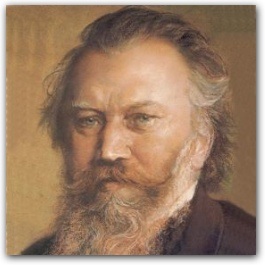The Virtue of Generosity
- DONALD DEMARCO
Generosity inspires gratitude, and gratitude inspires generosity. God is generous to us and our generosity, as St. Paul tells us, gives proof of our gratitude towards God (2 Cor. 9:11).
 Johannes Brahms
Johannes BrahmsIn gratitude we are human; in generosity we are divine: "You received without pay, give without pay" (Mt. 10:8).
An admirer of the great German composer, Johannes Brahms, left him 1,000 pounds in his will. Upon learning about the bequest, Brahms was deeply moved. "It touches me most deeply and intimately," he wrote to a friend. "All exterior honors are nothing in comparison." Then, in the very next sentence, he informed his friend that since he did not need the money, he was "enjoying it in the most agreeable manner, by taking pleasure in its distribution."
Thus, the virtue that touched Brahms inspired replication of itself in the generosity that Brahms himself demonstrated. And one hopes that it stirred the same virtue among his beneficiaries. Generosity is the virtue that can go on mirroring itself until the end of time.
The highest gift we can give to another is the gift of ourselves. Giving ourselves in this way epitomizes the virtue of generosity. The perfect example of generosity is God the Creator. By means of His generosity, He generated man in His image. For Christians, God's gift of Himself through Christ represents the ultimate form of generosity, and serves as a model for all human generosity.
Because God creates -- or generates -- man in His image out of His own generosity, a dynamic impulse toward generosity is implanted in the depth of man's being. As a consequence, to live authentically means to give generously. Personality and generosity, therefore, are virtually synonymous. To live authentically is to give generously of oneself. The great Thomistic philosopher, Jacques Maritain, underscored this unification of personality with generosity when he wrote: "Do not heroes and saints impress us as men who have reached the heights of personality as well as generosity?"
What are the limits of generosity? Since virtue is rooted in love, this question is tantamount to asking, "What are the limits of love?"
|
The highest gift we can give to another is the gift of ourselves. |
To the calculating mind, being generous seems to be costly. To the generous heart, being greedy seems incomprehensible. It is greed that impoverishes us, not generosity. True generosity, indeed, enriches us a hundredfold. There is a superabundance within each of us. Not to release it is to cost us who we are (cf. Jn. 12:24-25). Nothing, therefore, is more costly than greed; nothing is more rewarding than generosity. The fact that greed is as common as it is indicates that human beings can be estranged from themselves while trying to live a life that is alien to them.
Literary characters such as King Midas, Silas Marner, Ebenezer Scrooge, and The Grinch Who Almost Stole Christmas, are driven by greed in such a way that the more greedy they become, the less human they appear. The conversions of Midas, Scrooge, and the Grinch are, in effect, returns to humanity, and are met by readers with great jubilation. Generous people are not only more likable than their greedy counterparts, but they appear to be more human, more real.
A poor man who is in touch with the fundamental generosity of his existence can be productive, happy, and at peace with himself. It is more blessed to give than to receive; but it is far more blessed to give than to take. In the final analysis, we cannot take with us what we have, though many people seem to live as though they could. But we can leave behind what we have given. Greed is an affliction of the dispossessed. Generosity is the plenitude of the self-possessed.
 This is J. Fraser Field, Founder of CERC. I hope you appreciated this piece. We curate these articles especially for believers like you.
This is J. Fraser Field, Founder of CERC. I hope you appreciated this piece. We curate these articles especially for believers like you.
Please show your appreciation by making a $3 donation. CERC is entirely reader supported.

Acknowledgement
DeMarco, Donald. "The Virtue of Generosity." Lay Witness.
Reprinted with permission of Lay Witness magazine.
The Author




